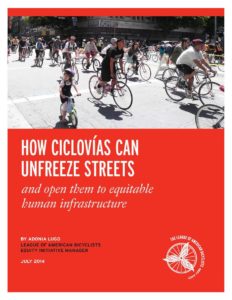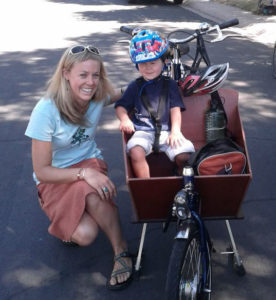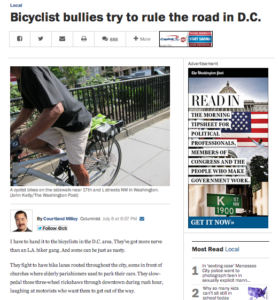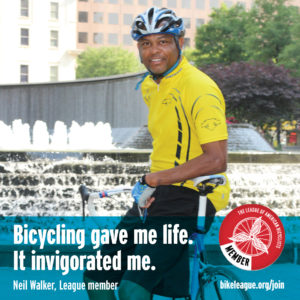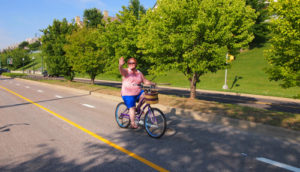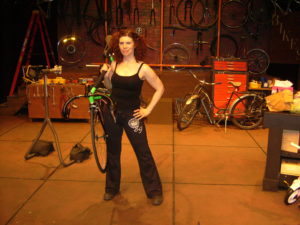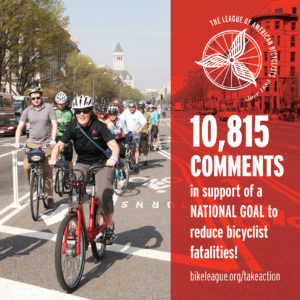Blog
Can a temporary street closure have lasting effects on everyday transportation habits? The social psychology concept of “unfreezing” habit suggests that it can, as detailed in a new report on “How Ciclovías Can Unfreeze Streets.” This report is based on fieldwork I undertook as an anthropologist studying bicycle advocacy and street culture in Los Angeles from 2008 to 2011. My central project was helping to organize the open street event CicLAvia. I found the ciclovía to be useful for identifying the “human infrastructure” that helps or hinders our work as active transportation change agents.
Read More →A single session at the 2013 California By Bike Summit radically reframed my perception of urban planning. In the final round of workshops I was drawn to an intriguing title: “Creating your own Biketopia: Community engagement workshop through play.” Presenter James Rojas didn’t disappoint. Put simply, the urban planner, artist and founder of the Latino Urban Forum has found a way to bring planning to the people. And we couldn’t be more excited to have him present and facilitate at Future Bike on September 11.
Read More →Last week, Sports Marketing Surveys USA released new data on the most popular sports and fitness activites in America — and biking ranked #6 on the list, with more than 41 million participants in 2013. While we often talking about the health benefits of bicycling, we focus on the physical: losing weight, managing diabetes, increasing energy. But, as Josie Smith, a rider and blogger in Decorah, Iowa, shared with us, cycling can heal our hearts and minds, as well. Here’s her story…
Read More →With more than 3,500 certified League Cycling Instructors nationwide, we have the privilege of working with hundreds of leaders who are delivering our Smart Cycling program and innovating bicycle education in exciting ways. Whether you’re an educator yourself or simply a bicycle enthusiast, our LCIs have so much knowledge and inspiration that we want to share their stories. In this first edition of LCI corner, Molly North, executive director of Bike Denver (and LCI #2669!), gives five helpful tips for marketing bike education.
Read More →Yes, we’ve seen columnist Courtland Milloy’s awful rant against bicyclists in yesterday’s Washington Post and wonder with you how such a dreadful piece of writing could find its way onto the pages of such a respected source of news. As usual, the question is how does one respond to such mindless vitriol? Facts clearly don’t matter. Self-righteous indignation probably isn’t going to make much of an impression, certainly not in the comment section of the paper’s website!
Read More →Joining the League is a way of giving back to cycling, to help others experience the joy and freedom that cycling brings. Neil Walker exemplifies that spirit of giving back. League Member Neil Walker first discovered cycling after a series of knee injuries ended his college basketball career. A specialist recommended cycling as an alternative to surgery. He got on a bike, strengthened his knee, and in the process found a new direction in life. “It has been a blessing to have cycling in my life,” Neil says. “It gave me life, invigorated me.”
Read More →Advocacy Advance recently released its latest report, “How Communities are Paying for Innovative On-Street Bicycle Infrastructure.” The report provides examples of how communities across the country are paying for separated bicycle infrastructure. Just like how communities are paying for other important civic infrastructure, communities are using a combination of federal, state, local/regional, and private sources of funds.
Read More →Out on Main Street, nearly 90 percent of local bike shops in the United States are owned by men. But off Broadway in New York City, “Bike Shop The Musical” is a one-woman show. Inspired by the rich cycling experiences of Liz Barkan — a former bike messenger, bike shop owner and spinning instructor — the fictional play follows the journey of Bobby, a female bike mechanic who works in her grandmother’s shop and is not only fixing flats but piecing her life back together after a tragic accident.
Read More →For this year’s National Bike Summit, I collaborated with New Orleans-based urban planner Naomi Doerner, now the executive director of Bike Easy, to create a historical overview of bicycling and bike advocacy in the United States. The project grew from a discussion we had about how to visualize bike equity for Summit attendees.
Read More →Thank you to the more than 10,000 of you who submitted comments to the Federal Highway Administration asking them to institute a non-motorized safety performance measure. As of this publication, there have been 10,815 comments submitted.
Read More →